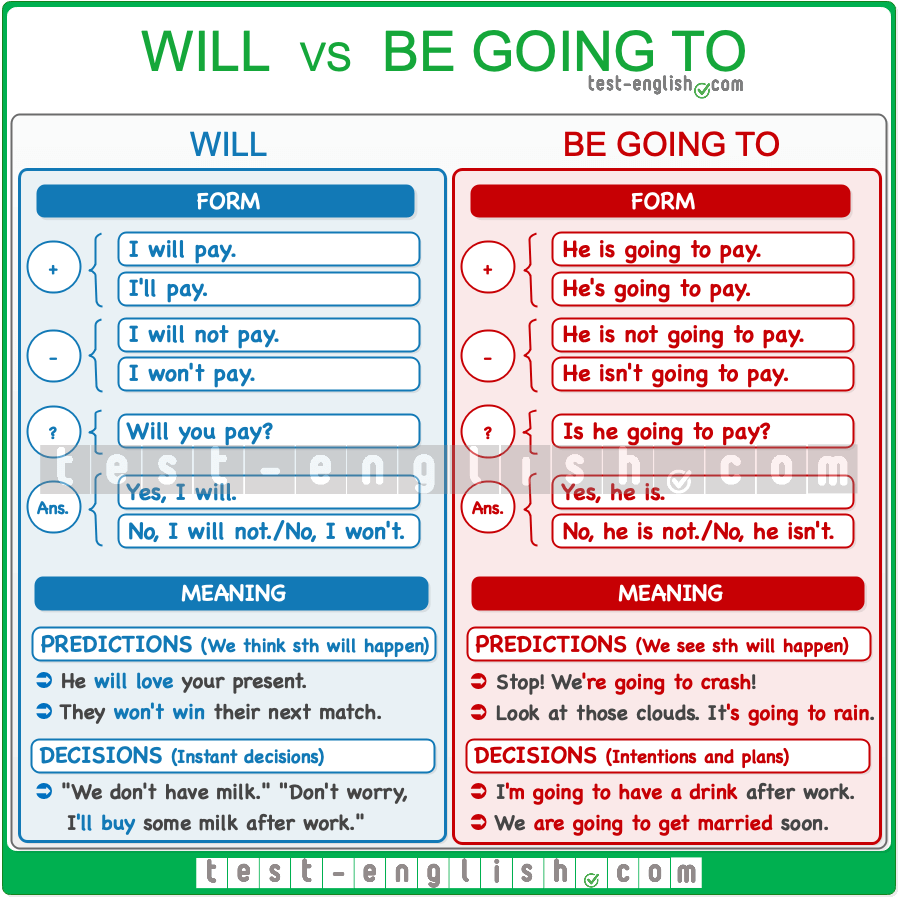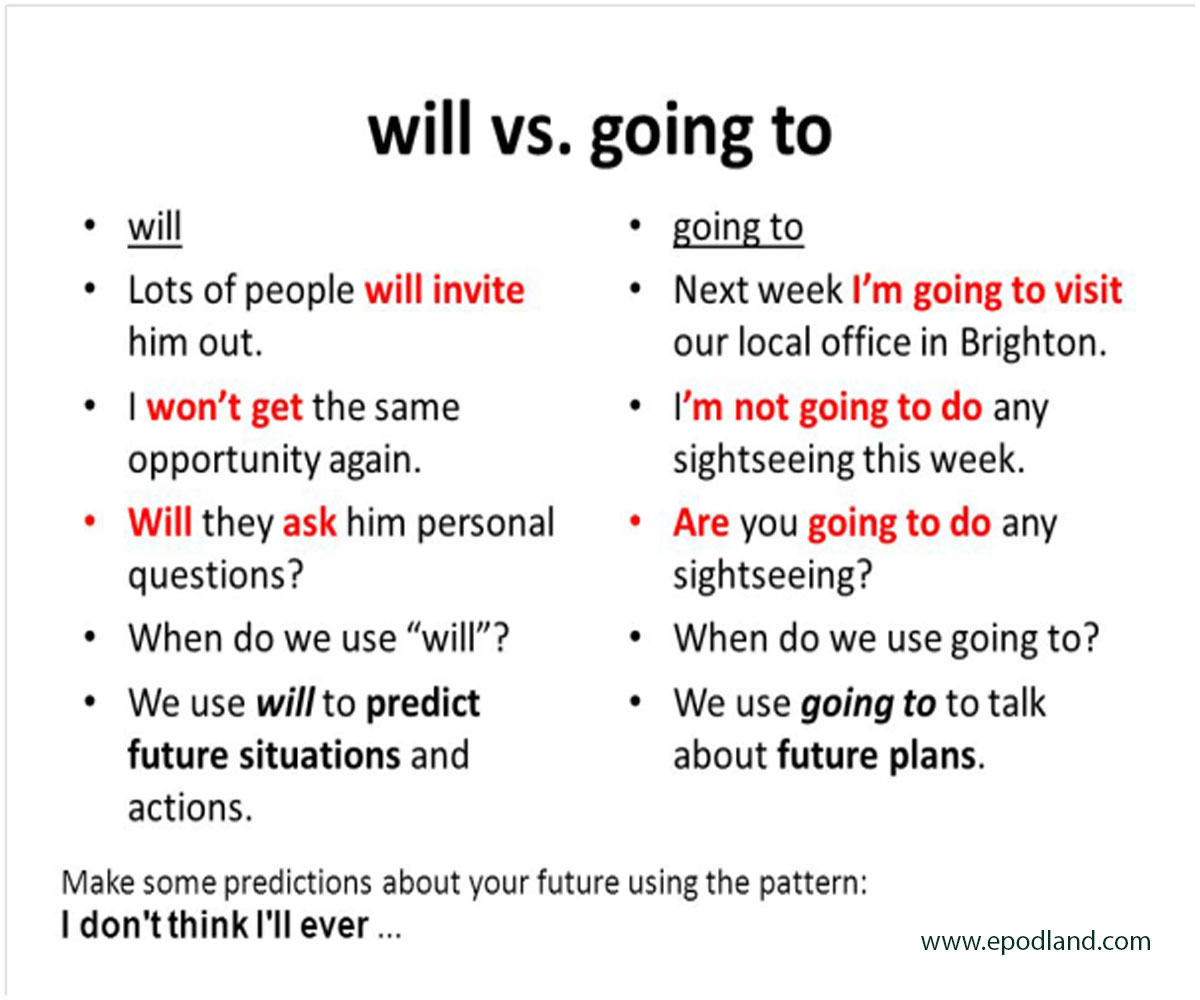
WillFuture or GoingtoFuture Übungen Unterrichtsmaterial im Fach Englisch
Future tense: WILL or BE GOING TO with answers. tulpen25. 30244. 498. 197. 0. 1/2. Let's do English ESL general grammar practice. These are exercises to practice and consolidate the correct usage of WILL or BE GOING TO in English.

'Will' vs 'be going to' Future forms TestEnglish
Students > Solutions > Pre-Intermediate > Grammar > Unit 6 - Exercise 1 - will and going to. Everyday English; Grammar Unit 6 - Exercise 1.

English Grammar Will or Be Going to ESLBUZZ
from English Grammar Today Will: form Affirmative form Will comes first in the verb phrase in a statement (after the subject and before another verb). It is often contracted to 'll in informal situations: The next Olympic Games will be in London. I'll give you a call at about 6 o'clock. Will cannot be used with another modal verb:

Will vs going to ficha interactiva y descargable. Puedes hacer los ejercicios online o descargar
In English grammar, both "Will" and "Be Going to" are used to express future tense but they do not have the same meaning. Key Takeaways Decision Timeframe: Use "will" for spontaneous decisions made at the moment of speaking. Use "going to" for decisions or plans made before the moment of speaking. Predictions:

Diferenças Entre Will E Going To AskSchool
to mean want to or be willing to: I hope you will come to my party. George says he will help us. to make offers and promises : I'll see you tomorrow. We'll send you an email. to talk about offers and promises: Tim will be at the meeting. Mary will help with the cooking. 4. We use be going to: to talk about plans or intentions:

Difference Between will and going to infographic English language teaching, Learn english
Students have to decide whether to use BE GOING TO or WILL and justify their choice. this ESL worksheet contains a series of traditional grammar drills and exercises. 2895 uses. komanbernadett. WILL or BE GOING TO. This EFL worksheet will help you to practise and tell the difference between WILL or BE GOING TO.

Will & Going to
"Will" and "going to" are used to refer to the future. In formal writing, there's one you should use over the other. We'll tell you which one. In formal writing, "will" and "going to" are used differently. Correct Use In casual speech and writing, will and going to are often interchanged.

Will and Going To with KEY Learn english, English grammar worksheets, English teaching resources
When writing down our lists of New Year's resolutions - if we're so inclined - they usually take this format: Exercise more. Spend more time with family. However, this is not how we communicate our ideas to others. When discussing our resolutions, we might consider them as a plan and might therefore use 'going to' - or we might.

Pin on ENGLISH
Be going to is commonly used in informal styles. Intentions We use be going to to talk about future plans and intentions. Usually the decision about the future plans has already been made: She's going to be a professional dancer when she grows up. I'm going to look for a new place to live next month. Predictions

Will and Going To with KEY worksheet Free ESL printable worksheets made by teachers English
Vocabulary Everyday English Audio and Video Downloads Test Builder Unit 11 Unit 12 Unit 2 will/going to Complete the conversations with the correct form of will or going to. Use short forms where possible. Copyright © Oxford University Press, Fri Jan 12 17:15:18 UTC 2024. All Rights Reserved. Learning Resources Bank | | Headway Student's Site

Future Tense 'will' or 'going to' Review English language teaching, Learn english, English verbs
The main difference between the two forms is that "going to" is used for plans and intentions made before the moment of speaking, and the "will" to speak about the future at the moment of speaking. Study these basic forms and then use the referenced resources to practice these forms. Teachers can print out these materials for use in-class, or.

Diferenças Entre Will E Going To AskSchool
Grammar test 1 Grammar explanation We use different verb forms to talk about our plans for the future, depending on what kind of plan it is: a spontaneous plan, a pre-decided plan or an arrangement. will We use will to talk about spontaneous plans decided at the moment of speaking. Oops, I forgot to phone Mum! I'll do it after dinner.

تفاوت will و going to در زبان انگلیسی سرزمین پادکست آموزش زبان انگلیسی با بهترین روش
The quick answer is that "will" and "be going to" are essentially the same. In English, both are tenses used for the Simple Future. (To learn more about the Simple Future, check out our Grammar Lesson of the Month post!) However, even though they are called the "Simple Future" tenses, they are not so simple. (Grammar joke!)

English How to use will and be going to in English, Differences Between “Will” and “Be going
They are also used to make simple predictions and show your reactions to something that was just said. Use going to to talk about planned future events or events that you see is about to happen. In some cases, either could be used. Complete the following sentences with will or going to. 1. I can't lift this box. OK. I.

TOMi.digital SIMPLE FUTURE AND FUTURE WITH BE GOING TO
Going to: future We can use a present form of be + going to + the base form of a main verb to talk about the future. We use it for plans and intentions, predictions and commands: I'm going to buy a new car next week. (plan or intention) You're not going to do all this in an hour.

Diferenças Entre Will E Going To AskSchool
Grammar explanation We can show how certain we are about the future by using modal verbs and other expressions. Modal verbs and adverbs We can use modal verbs (such as will, might, may or could) and adverbs (such as probably and definitely) to show how sure we are. Very sure People will definitely work from home more in the future.